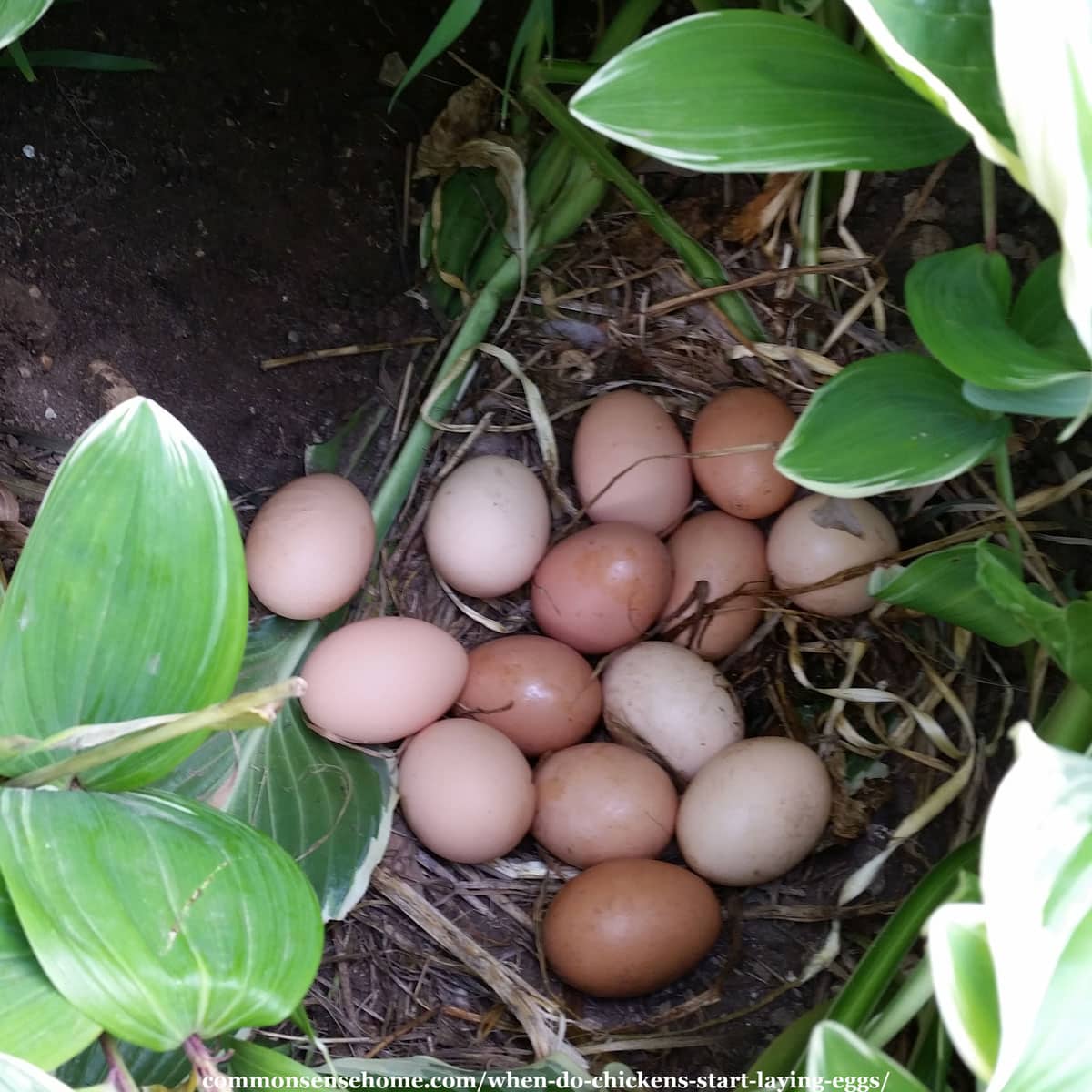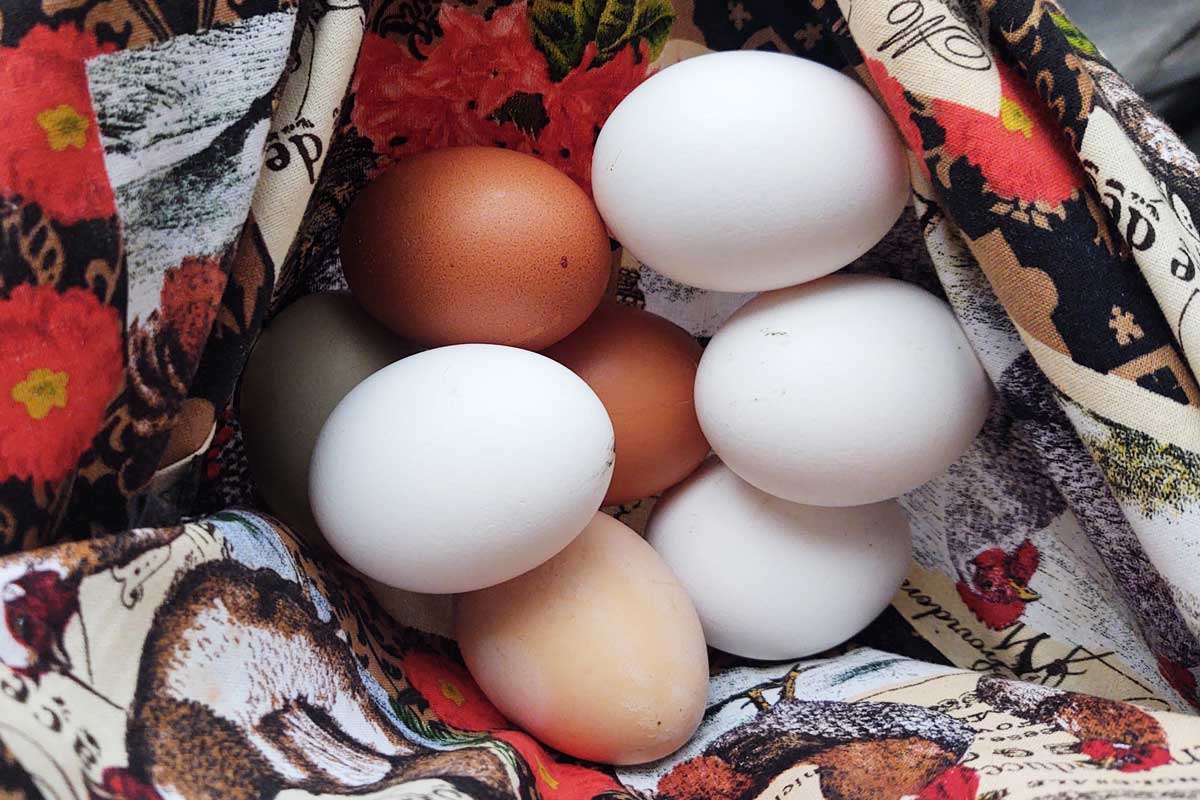When Do Chickens Start Laying Eggs? (And Why They Stop)
This post may contain affiliate links. Read my full disclosure here.
Let’s face it, most of us start raising chickens in order to have fresh eggs daily. The question of the day is “when do these freeloaders start paying rent?” If you’ve had your chickens for a couple of months or more and haven’t enjoyed collecting eggs for your morning breakfast, you’re not alone. We have the answer to your question, “When Do Chickens Start Laying Eggs?”, plus troubleshooting tips for an under-performing flock.

Table of contents
Chicken Biology 101
First, let’s cover some basic chicken biology. Only a hen, a female chicken, can lay eggs and she does not need a rooster in order to produce an egg. You only need a rooster if you want fertile eggs and baby chicks. Like humans, chickens are born with all of the eggs that they will ever have in their entire life.
Different Chicken Breeds
Different breeds of chickens have different character traits, including egg production. Some breeds are egg-laying rock-stars, such as ISA Browns or Golden Comets, and lay over 300 hundred eggs a year. Other breeds are less than stellar egg producers, like the Seabright Bantam that only lays 60 eggs per year.
Some chicken owners tend to think there is something wrong with their chickens because they won’t lay eggs, when in reality, they have a breed that isn’t considered a good egg-layer.
If you’re still in the planning stages of your flock, or would like to add more egg-layers to an existing flock, check out:
Best Laying Hens – For Beginners, White Eggs, Brown Eggs – OR –
My new book, The Beginner’s Guide to Chicken Breeds, which is a great resource for finding the perfect chickens for your flock.
How Long Does it Take for a Chicken to Lay its First Egg?
Chickens start laying eggs when they reach maturity. Generally, a hen starts between 18 weeks of age and 26 weeks of age. Some may start sooner or later depending on the breed and individual chicken.
It takes roughly 24-26 hours for a hen to produce an egg and generally 15-30 minutes to lay it.
Along with time, a hen needs 12-14 hours of daylight in order to produce an egg. This is why egg production decreases in the winter months and why many chicken owners use artificial light in the hen house. If your hens are not getting enough light, they will not produce an egg.
If your hen reaches maturity in late fall/early winter, you may not see your first egg until spring when the daylight hours reach 14 hours of light per day. Optimum egg production happens when we have 16 hours of light per day.
Resource: Michigan State University “Decreasing daylight and its effect on laying hens“.
What to Feed Your Egg-Laying Chickens
Feed blends are designed to meet the nutrient needs for the specific stage of growth your chicken is in. From birth to 21 weeks, chickens should be fed a starter and grower feed.
Around 22 weeks of age, you’ll want to switch them to a layer feed. Feeding your hens the wrong diet could delay egg production or result in poor egg quality.
In addition to the proper feed, you’ll want to offer your chickens free-choice calcium; either in the form of crushed eggshells or crushed oyster shells. Chickens also love produce, meat scraps, seeds, bugs, and many types of plants.
See “What to Feed Chickens – Do’s and Don’ts for a Healthy Chicken Diet” for more information.
Would you like to save this?
How Do You Know When Chickens Are Ready to Lay Eggs?
- Right Age ~ Your hen should be ready to lay eggs when she’s 5-6 months old. If you’re lucky, she will lay sooner.
- Ducking/Squatting ~ Hens squat close to the ground when they are ready to breed/lay eggs. When you approach your hen and she ducks or squats, you know she is getting of age.
- Darker Combs and Wattles ~ While growing, young hens combs and wattles are pale–almost white in color. As they age they start to become darker and red. This is a sign they are getting old enough to lay eggs.
- Nesting Box~ A hen that is getting ready to lay eggs will start looking for a comfy nesting area to lay and she’ll inspect the nesting boxes.
- Increased Eating ~ A gal needs extra energy for making eggs. Your soon-to-be egg makers will start to increase their intake when they get ready to lay.
- Song ~ The egg-song, which is music to my ears. The egg-song is the music (or cackle) your hen makes during the egg-laying process. It will be different than their usual chatter and generally occurs in the middle of the day.
How do I Get My Chickens to Start Laying Eggs?
Play a little Barry White? All joking aside, we’re always trying to rush nature. But nature has its own timeline and there aren’t many things we can do to change that. However, there are some steps we can take to help move along the process.
Go over our checklist to make sure your hens have everything they need when the time’s right to start laying eggs.
Egg-Laying Checklist
- Your hens are 5-6 months of age.
- You have an egg-laying breed.
- There are 12+ hours of sunlight per day.
- You’ve provided nesting boxes (see chicken nesting box examples).
- They are getting the proper feed.
- The temperature isn’t over 100 degrees or below freezing.
- Your chickens are healthy and show no signs of stress.
When you’ve done all of the above you just have to wait and be patient, because those golden yolked eggs will soon be on your plate.
Why Are My 6 Month Old Chickens Not Laying Eggs? Troubleshooting Tips
- Wrong Breed ~ Research your chicken breed in my new book, The Beginner’s Guide to Chicken Breeds, to make sure they are good egg-layers.
- Nutrition ~ Double check your chicken feed to make sure they are getting the proper food for their age.
- Age ~ Hens that are too young or that are too old will not lay eggs. If your hen is over three years of age, their egg production will slow down with each year of age.
- Molting – During molting (shedding old feathers and growing new feathers) chickens will often stop laying.
- They are laying, just hiding eggs ~ If only every hen would lay eggs in the nesting boxes you provide life would be easy. Alas, they LOVE to lay eggs in very odd places. We’ve found eggs in feed bags, shoes, hay stacks, you name it, they’ve laid an egg there.
- No peace ~ Hens don’t need complete privacy but they do like a little. See the tips in Chicken Nesting Boxes to make sure your girls have the perfect accommodations.
- Weather~ Chickens will reduce or stop egg production when the weather gets above 90 degrees or below freezing.
- Aggressive roosters~ Aggressive roosters will stress a hen out, causing her to quit laying eggs. If you have roosters, make sure to have 5-10 hens per rooster.
- Egg eaters ~ Sometimes chickens enjoy a tasty treat every now and then, as do dogs and other animals. When we weren’t finding any eggs, I noticed our dog munching on something. Sure enough, it was an egg. Check the nesting box often and remove eggs as soon as they are laid. Replace the eggs with golf balls or fake eggs to make egg stealing less appealing.
- Lighting ~ Reduced daylight hours results in low egg production. Chickens need to rest, much like we do, and the winter months is usually when this happens. You can add extra light to the chicken coop to stimulate production.

When All Else Fails
Editor’s Note: During 2022 and early 2023, it came to light that there may be quality issues with some brands of chicken feed. If everything else is right for your chickens to be laying, try switching your brand of chicken feed.
The issues are inconsistent, so it’s tough to track down. A brand will work fine for some flocks, while the same brand sold in another area results in no eggs. The food comes from different mills, even though it’s the same brand. There may be supply chain trouble, cost cutting, or something else going on.
After all the boxes are checked, your chickens should start laying eggs in no time, or at least you’ll have a better understanding as to why they aren’t laying right now. If all else fails you can always try to add some additional breeds to your flock that are known for egg production such as Rhode Island Reds or Leghorns.
More Chicken Resources
- Raising Chicken – The Easy Guide for Beginners
- How to Raise Chickens Cheaply – Tips for Raising Chickens on a Budget
- Quick Lock Chicken Door
- Bird Flu Busters – 5 Strategies for a Healthier Flock
- 50 Do-It-Yourself Projects for Keeping Chickens
- Meat Chickens – Best Breeds, Care and Troubleshooting Tips

This post is by Amber Bradshaw of My Homestead Life. Amber and her family live off grid on forty-six acres in the Smoky Mountains in East Tennessee.


